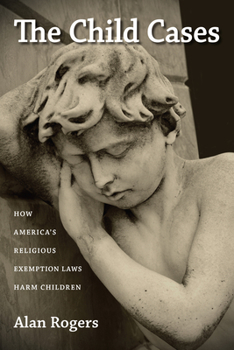The Child Cases: How America's Religious Exemption Laws Harm Children
When a four-year-old California girl died on March 9, 1984, the state charged her mother with involuntary manslaughter because she failed to provide her daughter with medical care, choosing instead to rely on spiritual healing. During the next few years, a half dozen other children of Christian Science parents died under similar circumstances. The children's deaths and the parents' trials drew national attention, highlighting a deeply rooted, legal/political struggle to define religious freedom. Through close analysis of these seven cases, legal historian Alan Rogers explores the conflict between religious principles and secular laws that seek to protect children from abuse and neglect. Christian Scientists argued--often with the support of mainline religious groups--that the First Amendment's "free exercise" clause protected religious belief and behavior. Insisting that their spiritual care was at least as effective as medical treatment, they thus maintained that parents of seriously ill children had a constitutional right to reject medical care. Congress and state legislatures confirmed this interpretation by inserting religious exemption provisos into child abuse laws. Yet when parental prayer failed and a child died, prosecutors were able to win manslaughter convictions by arguing--as the U.S. Supreme Court had held for more than a century--that religious belief could not trump a neutral, generally applicable law. Children's advocates then carried this message to state legislatures, eventually winning repeal of religious exemption provisions in a handful of states.
Format:Paperback
Language:English
ISBN:1625340729
ISBN13:9781625340726
Release Date:April 2014
Publisher:University of Massachusetts Press
Length:256 Pages
Weight:0.90 lbs.
Dimensions:0.7" x 6.0" x 9.1"
Grade Range:Postsecondary and higher
Customer Reviews
0 rating





